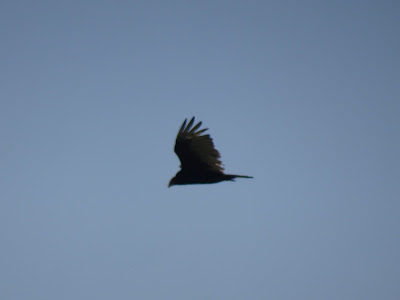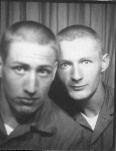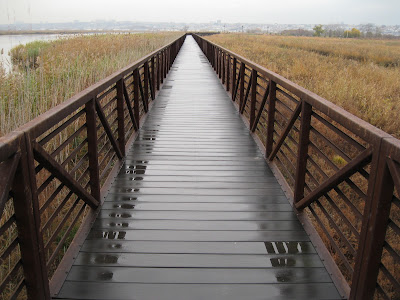Chapter 15: Counting the Hawks
I stared out the window of the bus and watched the farm
pass, across a landscape someone once called “The Great Bread Basket,” though
for me, the monotony of sameness I could not relieve with the book I had
purchased in Philadelphia but had neglected.
The bus plunged on into the afternoon of my second day out
from the city of Brotherly love, and the red glow of the slanted sunlight
illuminated everything as if we moved in a dream, or a reminder of those better
days at home when I wandered Garret Mountain in late autumn, a similar sun
setting through the changing leaves.
The miles wore on. Fence post after fence post connected by
strands of wire, behind which late season corn grew, swaying in anticipation of
a final harvest.
While speculation over the cause of the dead man's demise
lasted many people a long time, even that ran out after a while, with most of
us clinging to our windows for some relief, signs that we could read that would
even momentarily break up the monotony of the trip west. At one point, I saw a
barn side upon which huge letters were written advertising some place called
"Meramec Caverns," though just what these were, I did not discover
until much later, when told by someone in Los Angeles that the caves had served
as a hide out for Jesse James.
He had fought in the war before the Civil War, the murdering
abolitionists led by the murderous John Brown opposed by vengeful gangs from
the proslavery slavery south, looking for new land on which to raise cotton.
Lincoln had wandered in this part of the world, had put up fence posts, had
sailed down the long rivers to sell goods in New Orleans, had fought against
marauding Indians to keep them from stealing the farms settlers had carved out
of virgin land. He had lived with the boredom of these miles, even after his
family moved from Kentucky though here to Illinois, at an even slower pace,
giving him time to do more than just glimpse this world in passing – so flat it
was as if the land moved, not the bus.
I celebrated each gas station or string of stores,
discovering varieties of both I’d not heard of before, such as Sky Chief or
Phillips gasoline or Ted Drewes' Frozen Custard. When these grew scarce, I searched for tiny
differences to break up the monotonous miles, or around the bus at the other
passengers.
The Wartons slept through most of this, leaving me to ponder
what came next, their gray heads leaning against each other’s in their
afternoon siesta.
I lit cigarette after cigarette, more out of boredom than
habit. I kept remembering the east bound bus I had seen and wondered if New
York had seen snow yet. For some reason, I ached for snow – even though I knew
I might regret it when it came.
The hostess, slowly moving down the aisle in her regular
check on the passengers, took notice of me and paused near my seat.
“Is everything all right?” she asked.
She had unbuttoned the top two buttons to her uniform
blouse, no doubt because of the dry bus heat, then noticed me staring a little
at what was revealed, smiling with a kind of scolding look, calling me “a bad
boy,” without saying anything. I glanced back out the window, embarrassed.
“I’m fine,” I said.
“You don’t look fine,” she said, then slid into the vacant
seat beside me. “You haven’t seemed fine since we found that man…”
She tilted her head towards one of the seats in the rear,
although the man had died in a different bus, one we had left behind. Still,
the seat on this bus located where he had sat on the other, remained empty,
perhaps out of superstition, the other passengers, even the ones that had
bordered since, avoiding it, as if his ghost haunted it.
I must have stiffened; she patted my arm and smiled warmly.
“Don’t worry, I don’t mean to pry,” she said. “I’m just
bored, and you looked so helpless.”
“Helpless?” I said, unable to keep from laughing. “Really?”
“Like a deer caught in head lights,” she said, patting my
arm again, her smile turning into a laugh. “Just be careful, okay?
Then she was gone, leaving me to stare out the window again
as the miles and miles of sameness, swaying fields of gold as if the land had
turned into an inland sea, the motion of the bus like a boat rocking on its
waves.
I don’t know who caught sight of the first hawk, maybe Mr.
Warton, who for some reason jolted awake, and then pointed.
One of the fence posts, a large bird sat, sloping shoulders,
head bent, a sharp downward-turned beak, his large eyes studding the fields of
growth, in search of something I knew we could not see, would not see, but
might launch the creature into flight in an instant, deadly talons ready to
tear flesh in its hunger.
“What the hell is that?” I asked.
“A hawk,” Mr. Barton said. “And I big one at that, just
sitting there on that post as if it owned it.”
The raptor didn’t seem real to me, and I watched it as the
bus passed and it and the fence post faded into the haze of the bus’s exhaust,
dream-like, not real to me at all.
Then I saw another one on another fence post, and a short
time after that, still another.
I actually rubbed my eyes and then took a closer look, the
stern shapes against the backdrop of wavering fields of grain, not mean, not
vicious, almost regal – different from the royalty I expected in a bald eagle,
more like a warrior’s, tough, determined to survive, capable of great violence
and also great patience, even peace. Each one looked as grand as a statue,
which I might have mistaken them for if not for the slight turn of head and
their intense stare. From post to post, I imagined one or more of them looking
back at me.
With the exception of the Wartons, none of the other
passengers seemed to notice, too bored or wrapped up in reading or sleeping or
maybe even thoughts of what they might do when finally, the bus brought them to
where they needed to go.
“Are they hunting?” I asked Mr. Warton.
“I suppose they are,” he said. “But I swear they seem to be
watching us, or at least, watching traffic go by.”
Watching something, I thought, maybe everything, these
beasts needing to see everything that went on, if not just to feed, then to
keep from being something that other beasts fed on.
But what beast would be so bold as to hunt the hunter, I
wondered.
Mrs. Warton did not seem as interested in this as her
husband and I and picked up a fashion magazine, yawning as she did, as if
civilization somehow protected her, protected us, from the savage world around
us, a world tamed by stronger men and women than we were, white or red skin,
black or yellow, bred with survival instincts long since bred out of us. And we
passed through this world of eat or be eaten, if not immune, then unaware,
tourists in some exotic wildlife habitat that would devour us if we even
strayed a bit from our comfortable bubble.
I felt cold and vulnerable, and tried to direct my attention
away from the hawks and the fence post, seeking some alternative landmark by
which I might gauge our progress, grateful when some odd building cropped up
the midst of the sameness, or the occasional billboard advertising some
business or feature still ahead – such as the billboard alerting us to the
Wagon Wheel Motel, unlighted, paint pealing in the daylight, perhaps less dingy
by night – I would never know.
Even with the hawks, the sameness of the landscape made it
impossible to remain attentive. I nodded off, then woke, then nodded again.
Mrs. Warton shook me awake at one point to point out Pecan
Joes, a roadside candy store that had become local legend. Except for the wagon
wheels leaning here and there, and a few plants under its awning, it lacked any
special appeal, although here, with nothing else to compare it again, it seemed
a magnificent sight, one I soon missed once we passed.
She woke me again to look at Verelle's motel, cafe and
Bar-G-Que house, which was even less spectacular than Pecan Joes, but an equal
relief, as if any sign of civilization meant something out here in the endless
flatlands.
I slept through our
stop in Columbia, but was told I hadn't missed much, which made me wonder how
little of it there was to see if no one had bothered to wake me. We had started
seeing regular signs for Kansas City, though the milage counter was still high
enough to provide very little relief.
Somewhere in the back of my head, lyrics stirred, about
fields grain and majestic purple mountains. I could see for miles and miles but
saw no mountains.
Behind me and on the other side of the bus, the young lovers
giggled, obviously finding other ways to entertain themselves, much to the
chagrin of passengers seated nearer to them, some coughing as if to hint that
the couple should tone down their antics a little so other people might sleep
or read or whatever others did to district themselves from the monotony.
The man behind me seemed to sleep and read between his
coughing, and I often wondered if he would die next before we reached our
destination. The man with the pipe puffed on, leaving his trail of smoke
through the bus, his attention preoccupied by the stack of papers he bought at
each rest stop. It didn't seem to matter much what papers they were, and once
in a great while I heard him chuckle, and I imagined him -- so used to reading
the New York Times -- finding humor in papers dedicated to reports on the
health of hogs.
The hostess did her
best to cheer us up, traveling from one end of the bus to the other with
sandwiches and drinks, pausing to talk with any who looked too lonely. My
sandwich this time was egg salad, something I didn't particularly like, but ate
just the same for something to do.
Then, I saw the first
sign for Denver.
In the middle of the
flattest land I could ever imagine, a sign claiming Denver was 500 hundred
miles west of here.
Numerous contradictory feelings rushed through me all at
once, giving me that strange disorientation I sometimes got when walking into
the wrong room and not noticing until I had sat.
I got the sense I might be on the wrong bus and flagged down
the hostess.
"I'm a little confused," I said. “I didn’t think
this bus went to Denver.”
“It doesn’t,” she said. “You would have to get off in Kansas
City for another bus to go there. We'll turn south towards Oklahoma just after
we leave Kansas City."
As the hostess moved on, I wondered if I should go back to
my original plan, head straight to Denver rather than divert to Los Angeles.
After all, I’d only changed direction to avoid Chicago and the possibility of my
uncles or the police laying in wait for me there.
Who in their right mind would figure me going by Kansas City
instead?
I no longer counted
hawks. I no longer looked out the window at destination signs. I stared at the
back of the seat in front of me. To stop or not to stop at Kansas City, to seek
out Louise for whom I had stolen the money to go see in the first place.
Yet something nagged at me, some odd fear similar to the one
I’d felt in Pittsburgh, an unseen terror lurking somewhere on the more direct
road, less distinct that fear of Chicago. For some reason, Denver seemed more
dangerous than even Chicago – since it was likely everybody already knew that
it would be my ultimate destination.
Would I be safer taking the longer route via L.A.?
So engrossed was I in these thoughts, I didn’t even look up
when Mrs. Warton nudged me to look at the junk yards outside Joplin, or the
string of buildings that made up Main Street.
Was I going to get off in Kansas City, or what?
I had no clue.




Comments
Post a Comment